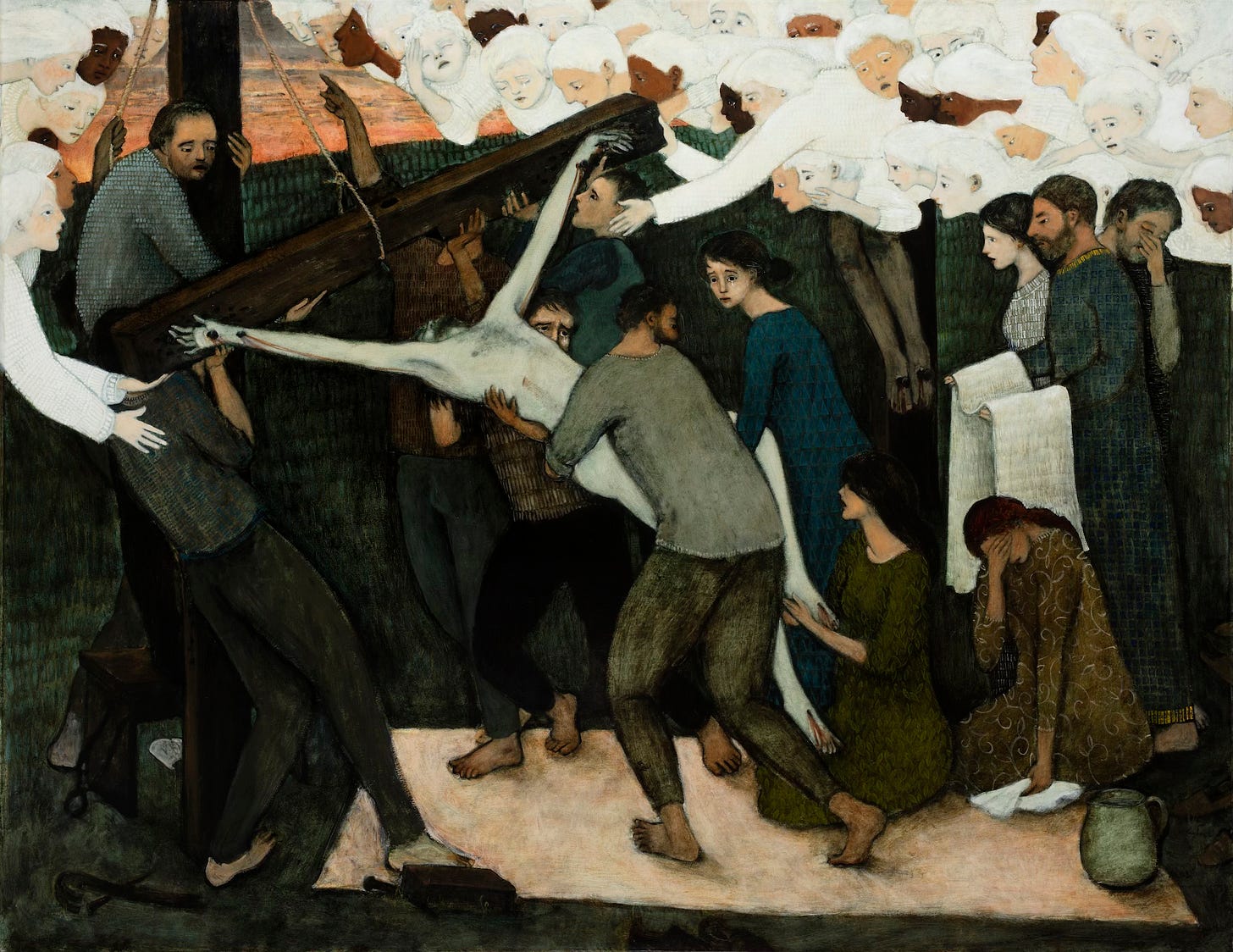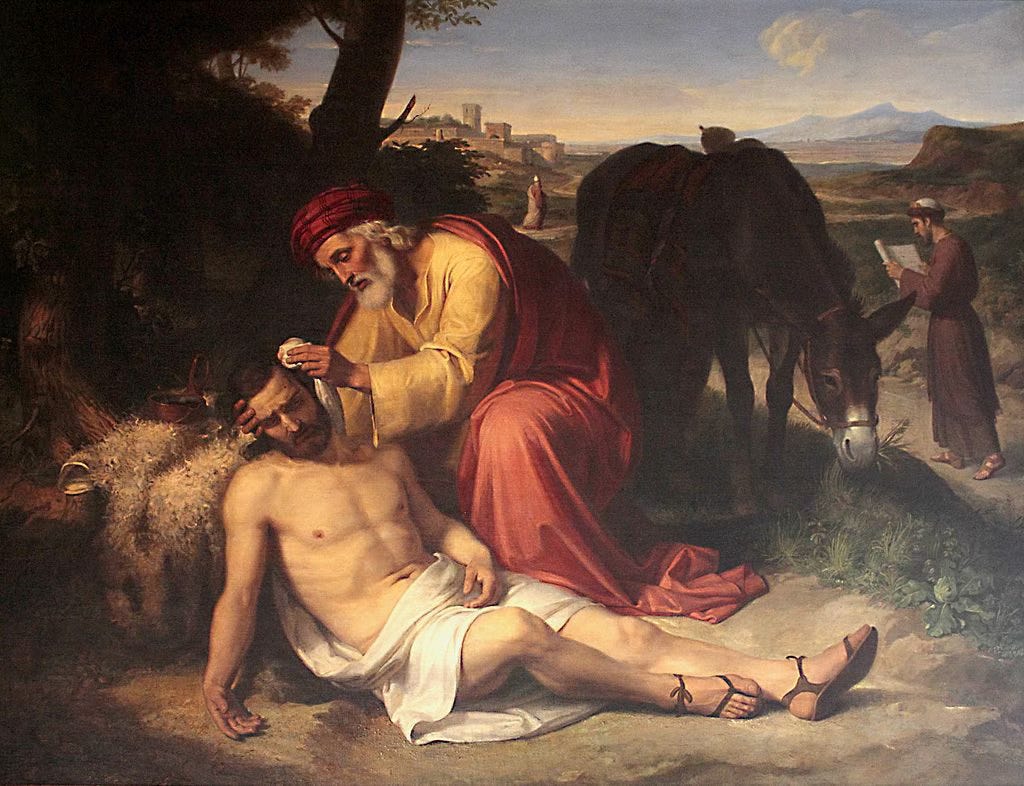My eyes close tightly with the remembering of it.
The day I broke someone’s heart. The moment I didn’t see them, didn’t stop, didn’t quiet the buzzsaw for just five minutes to be present in their hurt.
It was a Sunday. I’d just attended a church meeting and was on my way to another, and another one after that. Most Sundays began at 5:30 am and didn’t end until well into the evening. It was easy to sometimes use this against people in need. “I know you could use more of my attention, but hey, I’m spending hours taking care of so many people. Nothing personal, understand?”
I can still remember exactly where it happened - where I was standing in relation to her. It was hot outside (was that my excuse?) and I remember shading my eyes just to see their faces. Her husband said “hello” and clearly signaled he wanted to talk. I may have paused just long enough to return the greeting and wave to her - his wife, and their children, and then I was off. The Too Busy To See, Too Tired To Notice, Too Driven By Tasks “disciple” of Jesus. I wonder if He closed His eyes at that moment? If He was disappointed in me?
I got the phone call the next day as I was driving to work. This sister’s husband wanted me to know how disappointed he had been that I hadn’t taken a few minutes to talk with his wife. He told me her faith was really fragile, that she was questioning her relationship with God and with her beliefs, and how much it would have meant if I had stopped and visited with them instead of rushing off, leaving them and especially her to feel unseen and unimportant.
I stumbled over my words. I felt the red heat of shame rising in my face. I tried to apologize and somehow make it right. He was gracious and appreciative but also wary. I couldn’t blame him. He’d thought I could make a difference. Hoped I could bring comfort. Instead, I’d broken two hearts - his and hers. Love’s wrecking ball in a white shirt, blue suit, and tie.
I promised him I would try and make amends. I think I did. And eventually, perhaps even a year or two later, we shared a sacred, healing moment together.
I was recently reminded of this experience as I pondered the current crisis of compassion many are experiencing as a consequence of choices being made by those in power. This won’t be an explicitly political post, but if you feel I’m ill-informed or I’m misunderstanding what is actually happening, the comment section is open!
It’s probably been at least twenty years ago that I first read C. Terry Warner’s Bonds That Make Us Free. This book was the summary of his life’s work studying and teaching the concepts of self-deception and self-confrontation in order to love others with the best part of ourselves. It is a demanding read. It was in Bonds that I was introduced to the teachings of Austrian-born Jewish philosopher Martin Buber.
Buber is best known for his philosophy of dialogue, particularly his concept of the “I-Thou” relationship. His most famous work, I and Thou (1923), explores the ways in which human beings relate to each other and to the divine, distinguishing between two fundamental modes of engagement:
• “I-Thou”: A deep, mutual, and authentic relationship where individuals truly encounter each other or the divine as whole beings.
• “I-It”: A more utilitarian and detached interaction where people treat others as objects or means to an end rather than as unique individuals.
(The Marginalian has a great summary here.)
I have not read Buber’s book, but I think Dr. Warner did an excellent job of capturing the core truth he was teaching: There are fundamentally two ways of seeing others - either we see them as an other, a unique, valued, soul, or we see them as an object - an “it” - to be acted upon for our benefit. “I and Thou” is a unique way of saying what I think Jesus Christ lived and taught:
“The worth of souls is great in the sight of God.” D&C 18:10
“For God so loved the world, that he gave his only begotten Son, that whosoever believeth in him should not perish, but have everlasting life.” John 3:16
“He doeth not anything save it be for the benefit of the world; for he loveth the world, even that he layeth down his own life that he may draw all men unto him. Wherefore, he commandeth none that they shall not partake of his salvation.” 2 Nephi 26:24
“What is man, that thou art mindful of him? or the son of man, that thou visitest him? Thou madest him a little lower than the angels; thou crownedst him with glory and honour, and didst set him over the works of thy hands.” Hebrews 2:6-7
“A new commandment I give unto you, That ye love one another; as I have loved you, that ye also love one another. By this shall all men know that ye are my disciples, if ye have love one to another.” John 13:34-35
These and many other verses testify of the infinite worth of each of God’s children and invite us to see others as He sees them. In contrast, when we disregard the humanity and infinite worth of a son or daughter of God, they become instead just means to an end - an end that is for our benefit, regardless of what it might cost the other.
Of the many parables that teach this important truth, perhaps my favorite is the Parable of the Good Samaritan. We all know the story found in Luke 10. I was struck in my most recent reading by the choice each person made after stumbling upon the man who had fell among thieves:
Vs. 31 The Priest: “and when he saw him, he passed by on the other side.”
Vs. 32 The Levite: He “came and looked on him, and passed by on the other side.”
Vs. 33-34 The Samaritan: “when he saw him, he had compassion on him, And went to him, and bound up his wounds…”
The Savior’s choosing to make the Samaritan a type of Himself is certainly not coincidental. I think it is central to the potency of this parable. The Savior’s immediate audience - the Israelites - despised the Samaritans. They wanted nothing to do with them and would go out of their way to avoid any form of contact. Jesus choosing to making Himself the Samaritan in the story is a powerful moment of “I and Thou” thinking and would likely have been unsettling to His disciples. To them the Samaritans were lesser, unworthy, undeserving - cast offs.
So which character am I in the parable? Which one are you? At one level we are all “the certain man” who fell among thieves. We are all sinners, wounded by sin and left for dead. We each need the “Good Samaritan,” Jesus Christ, to come to our rescue and to bind up our wounds. (For an excellent study on all of the symbols found in this parable, here’s a great resource.) But the more important question the parable is asking is this: Am I the Priest, the Levite, or the Samaritan?
But when he saw the multitudes, he was moved with compassion on them, because they fainted, and were scattered abroad, as sheep having no shepherd.
Matthew 9:36
All of this to try and make a single point: How we see and treat one another matters very much to heaven. When we read Matthew 25:31-46, Jesus makes it clear how we treat “the least of these” will determine whether we are found on His right hand or on His left.
Another essay on this topic I have been greatly impacted by was Michael Austin’s The Sacrament of Attention published in Wayfare in September 2023. It is one of those things you read that changes how you see. In his essay Austin references Simone Weil’s book Waiting for God and includes the following quote:
“Not only does the love of God have attention for its substance; the love of our neighbor, which we know to be the same love, is made of this same substance. Those who are unhappy have no need for anything in this world but people capable of giving them their attention. The capacity to give one’s attention to a sufferer is a very rare and difficult thing; it is almost a miracle; it is a miracle. Nearly all those who think they have this capacity do not possess it. Warmth of heart, impulsiveness, pity are not enough.”
Austin then shared the following, which I think about often:
To me, these are the most challenging words in the essay, and possibly the most challenging words in the world. They call us to take service and charity further than even the New Testament does. Weil says that loving other people requires us to give them our full attention. This includes noticing and ministering to physical needs like food and shelter, but that is just a small part. The most basic and universal human needs include the need to be seen and understood, the need to be taken seriously, the need to be appreciated, and the need to be paid attention to. “The love of our neighbor in all its fullness simply means being able to say . . . ‘What are you going through?’” Weil suggests at the end of her great essay, “Only [those] capable of attention can do this.”
If I am being honest here, I rarely, rarely give anyone, even those I love the most, my full attention. And I am constantly fighting against the urge to judge others and classify them in some way as either deserving or not deserving of my full and loving attention. This is not good. This is not Jesus’s way.
I am pained by how so many of my brothers and sisters, children of God, are being treated today. I cannot imagine how this could be pleasing to Him. I support the enforcement of laws and believe that governments should fairly and consistently enforce the law. But this moment seems to be more about revenge and punishment than it has to do with impartial justice. Even in such situations, mercy is also important. Compassion is also important.
I pray for eyes to see as Jesus sees, and for hearts to love as Jesus loves.









President Livingston,
Thanks for this. It’s very beautifully written. I think about this a lot in my work at the hospital-too often the constraints of time and cost dissuade us from taking the time to really understand our patients and their experiences.
I have really struggled with the things going on. I don’t know how to reconcile a belief that sovereign borders and laws are important and should be enforced with the feeling that so many would find even a tiny portion of the American dream to be a miraculous, life-altering event. All I can think of is making the legal entry process much easier while still enforcing against illegal entry. But I don’t know quite what the Savior would do here. The same that paid the tax to Caesar but also ministered to everyone without hesitation.
I’m paraphrasing a quote from the Slow Work of God by Rachel Cope; Zion isn’t a place, it’s a state of mind fully consecrated to God. Thanks for sharing